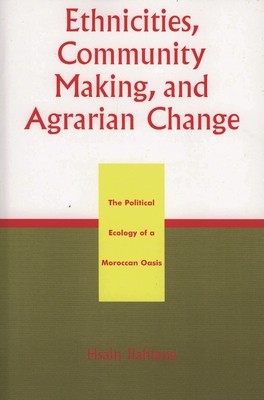
- We will send in 10–14 business days.
- Author: Hsain Ilahiane
- Publisher: University Press of America
- ISBN-10: 0761828761
- ISBN-13: 9780761828761
- Format: 15.2 x 22.9 x 1.3 cm, softcover
- Language: English
- SAVE -10% with code: EXTRA
Ethnicities, Community Making, and Agrarian Change (e-book) (used book) | bookbook.eu
Reviews
Description
This ethnography studies how, when, and under what circumstances culture change occurs. It is author Hsain Ilahiane's conviction that culture change directly affects resource use and community building processes. This study investigates the relationship between ethnicity and agricultural production at the household level, as well as the result of recent ethnic transformations in the restructuring of patterns of land access and social mobility within ethnically stratified communities. Ilahiane focuses specifically on the intensive farming systems of Morocco's Ziz Oasis, a 250 km long expanse watered by the Ziz River. Surrounded by Saharan desert, the valley houses a dense, rapidly grown, and ethnically diverse population of Arabs, Berbers, and Haratine (blacks). The author employs a varied body of data collected during fieldwork, including ethnographic accounts, oral histories and colonial archival records, and socio-economic and ecological findings based on a household questionnaire strategy.
EXTRA 10 % discount with code: EXTRA
The promotion ends in 17d.13:16:03
The discount code is valid when purchasing from 10 €. Discounts do not stack.
- Author: Hsain Ilahiane
- Publisher: University Press of America
- ISBN-10: 0761828761
- ISBN-13: 9780761828761
- Format: 15.2 x 22.9 x 1.3 cm, softcover
- Language: English English
This ethnography studies how, when, and under what circumstances culture change occurs. It is author Hsain Ilahiane's conviction that culture change directly affects resource use and community building processes. This study investigates the relationship between ethnicity and agricultural production at the household level, as well as the result of recent ethnic transformations in the restructuring of patterns of land access and social mobility within ethnically stratified communities. Ilahiane focuses specifically on the intensive farming systems of Morocco's Ziz Oasis, a 250 km long expanse watered by the Ziz River. Surrounded by Saharan desert, the valley houses a dense, rapidly grown, and ethnically diverse population of Arabs, Berbers, and Haratine (blacks). The author employs a varied body of data collected during fieldwork, including ethnographic accounts, oral histories and colonial archival records, and socio-economic and ecological findings based on a household questionnaire strategy.


Reviews